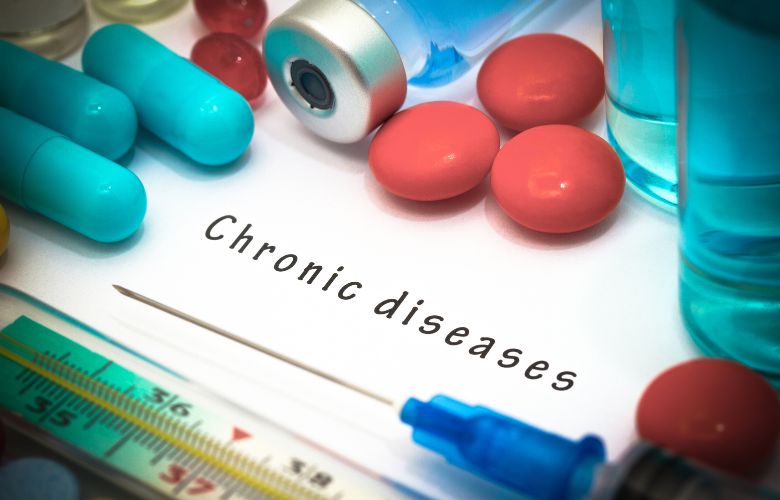Introduction
The risk of chronic disease is on the rise, and while it can’t be blamed on one thing alone, certain habits increase your risk of developing conditions like heart disease, diabetes, and cancer. You should understand that chronic disease management is a key component of any healthcare provider’s practice, but it can be difficult to manage if you don’t know what you’re doing. If you’re unsure how to treat chronic illnesses, or want to learn more about what causes them and how they should be managed, here are some tips for getting started.
Sitting still
 It is estimated that we spend up to 90% of our time sitting down. Your body was designed to be in motion, not at rest. The first step to staying healthy is getting up and moving around every 20 minutes.
It is estimated that we spend up to 90% of our time sitting down. Your body was designed to be in motion, not at rest. The first step to staying healthy is getting up and moving around every 20 minutes.
The Centers for Disease Control and Prevention (CDC) recommends that adults get at least 150 minutes of moderate-intensity aerobic activity each week. This is about 30 minutes per day, five days a week. Exercise has many health benefits and can help you live longer. It also helps prevent chronic diseases like diabetes and high blood pressure.
Staying active throughout the day has many benefits: it will boost your metabolism and help you burn more calories, improve your sleep quality, reduce stress levels, and give you more energy for physical tasks. There are lots of ways to sneak movement into your day without having to add hours on top of what’s already in it, take a walk around lunchtime instead of eating at your desk; take the stairs instead of an elevator; get off the bus one stop early so that you can walk home from work rather than drive; do some yoga stretches while watching TV in bed instead of just lying there watching Netflix all night long.
Skipping breakfast
 Skipping breakfast can lead to weight gain, and it’s one of the most common habits among people who are overweight. Breakfast helps people feel full and energized throughout the morning, so they’re less likely to overeat later or binge on unhealthy snacks. A healthy breakfast will also provide you with nutrients that keep your body running at peak performance throughout the day.
Skipping breakfast can lead to weight gain, and it’s one of the most common habits among people who are overweight. Breakfast helps people feel full and energized throughout the morning, so they’re less likely to overeat later or binge on unhealthy snacks. A healthy breakfast will also provide you with nutrients that keep your body running at peak performance throughout the day.
To make a healthy breakfast, try eating foods rich in fiber (like whole-grain bread), protein (like eggs), fats (like nuts), or carbohydrates (such as oatmeal). If you have time before going out into the world, choose something that can be prepared ahead of time like overnight oats or yogurt parfaits with fruit mixed in, you’ll be able to eat them at your desk without dirtying dishes. If you don’t have any leftovers from last night’s dinner party hanging around in your fridge but still want something filling enough for a morning meal, consider making yourself an egg sandwich using two slices of whole wheat bread spread generously with butter followed by two scrambled eggs cooked over easy style on both sides until golden brown around edges but not overcooked inside.
If possible avoid eating anything else until lunchtime rolls around; if not possible then just remember not to go overboard when snacking during breaks between classes since this could result in higher blood sugar levels due to carbohydrate intake being too high relative to what the body needs during rest periods between activities requiring energy consumption during waking hours when metabolism slows down naturally due to lack of physical activity while sleeping through majority waking hours.
Eating processed foods
 In addition to exercising regularly, there is another habit that can help reduce your risk of developing chronic diseases: eating healthy foods. Eating healthy foods means eating more fruits and vegetables while reducing or eliminating foods that are high in fat or calories such as fast food or junk food. Eating healthy foods helps keep your body functioning properly as well as keeping your weight under control which also helps reduce your risk of developing chronic diseases such as hypertension and heart disease.
In addition to exercising regularly, there is another habit that can help reduce your risk of developing chronic diseases: eating healthy foods. Eating healthy foods means eating more fruits and vegetables while reducing or eliminating foods that are high in fat or calories such as fast food or junk food. Eating healthy foods helps keep your body functioning properly as well as keeping your weight under control which also helps reduce your risk of developing chronic diseases such as hypertension and heart disease.
The biggest risk of eating too much processed food is that you’re not getting the nutrients and vitamins you need. Processed foods can be high in calories and low in nutritional value. This can lead to nutritional deficiencies, which are common in people who eat a diet heavy on processed foods. This could cause health problems such as chronic fatigue, heart disease, or even cancer.
The reason for this is that processed foods are often high in sodium, sugar, and other preservatives that can negatively affect your body’s ability to absorb nutrients from other foods. For example, if you’re consuming a lot of processed meat products like hot dogs or sausage links (which contain a lot of sodium), then it will make it harder for your body to absorb nutrients from other sources like vegetables and fruits which contain less sodium but still have lots of important vitamins and minerals.
Processed food is everywhere. It’s in every grocery store, every corner store, and even at the gas station. It’s easy to find because companies spend millions to convince us that their products are good for us: they’re colorful, they have fun packaging and they taste delicious! But the truth is that the food industry has spent decades developing methods to make processed foods taste better while keeping costs low, so they can sell more of them at higher profits. This means that most processed foods contain far too much sugar or salt or fat than our bodies need and often all three at once.
Not getting enough sleep
 A good night’s sleep is incredibly important for your health, both mental and physical. The National Sleep Foundation recommends adults get 7-9 hours of sleep per night to maintain optimal health; however, many people are not getting enough sleep regularly. The consequences of not getting enough sleep include increased risk for hypertension, obesity and metabolic syndrome, diabetes mellitus type 2 (type 2 DM), depression and anxiety disorders as well as reduced cognitive function with potential effects on learning ability.
A good night’s sleep is incredibly important for your health, both mental and physical. The National Sleep Foundation recommends adults get 7-9 hours of sleep per night to maintain optimal health; however, many people are not getting enough sleep regularly. The consequences of not getting enough sleep include increased risk for hypertension, obesity and metabolic syndrome, diabetes mellitus type 2 (type 2 DM), depression and anxiety disorders as well as reduced cognitive function with potential effects on learning ability.
Another thing that happens when we don’t get enough sleep is that our bodies don’t function properly during the day. We tend to feel more tired than usual and find it harder than usual to concentrate on our work or schoolwork; there’s also a higher chance that we’ll make bad decisions just because we aren’t thinking clearly due to lack of sleep.
The best way to get good quality sleep is by practicing some basic habits that promote healthy restful nights:
- Stop eating at least two hours before bedtime, so your body has time to digest food before you go to sleep. Eating too much before bed can make it harder to fall asleep because digestion takes energy that could otherwise be devoted to deep sleep.
- Avoid caffeine after 6 p.m., especially if you’re sensitive to it or prone to insomnia due to its effects on your nervous system.
- Limit alcohol consumption in the evening hours, it has been shown to interfere with REM sleep and lead to less restful sleep overall.
- Exercise regularly during the day so that you’ll be tired when it’s time to go to sleep
- Stick to a regular schedule: Wake up at the same time every day (or as close as possible), go to bed at the same time every night, and avoid napping during the day (this will help keep your body’s internal clock in sync).
- Create a relaxing environment: Dim lights before bedtime (but don’t turn them off completely), avoid using electronics before bedtime (they emit blue light which can keep you awake), and avoid bright lights in your bedroom at night
- Use earplugs or white noise machines if there are loud sounds nearby that could disturb your sleep.
Smoking Cigarettes
 Smoking cigarettes is bad for your health. What’s that? Did you know that already? Well, did you know that smoking can cause cancer in the mouth, throat, esophagus, lungs, and bladder? It can also increase the risk of heart disease by 30 to 60%. Smoking increases the risk of stroke and lung diseases such as chronic obstructive pulmonary disease (COPD) and acute respiratory distress syndrome (ARDS). It causes eye problems such as cataracts and macular degeneration; it may also lead to tooth loss or other oral health issues like periodontal disease. Smoking during pregnancy has been linked with an increased risk of miscarriage among women who are pregnant for the first time or are having their second child.
Smoking cigarettes is bad for your health. What’s that? Did you know that already? Well, did you know that smoking can cause cancer in the mouth, throat, esophagus, lungs, and bladder? It can also increase the risk of heart disease by 30 to 60%. Smoking increases the risk of stroke and lung diseases such as chronic obstructive pulmonary disease (COPD) and acute respiratory distress syndrome (ARDS). It causes eye problems such as cataracts and macular degeneration; it may also lead to tooth loss or other oral health issues like periodontal disease. Smoking during pregnancy has been linked with an increased risk of miscarriage among women who are pregnant for the first time or are having their second child.
Want to decrease your risk

If you want to decrease your risk of chronic disease, change these negative habits.
- If you want to decrease your risk of chronic disease, change these negative habits.
- Sitting still for long periods can increase the risk of heart disease, diabetes, and cancer.
- Eating processed foods increases your chances of cancer and other chronic diseases.
- Not getting enough sleep can lead to several health issues including diabetes, high blood pressure, and an increased risk of stroke.
- Smoking cigarettes increases your chances of lung cancer, throat cancer, heart attack, and stroke.
Conclusion
If you’re looking to improve your health, these habits can be a good place to start. Make sure you’re eating well, getting enough sleep, and exercising regularly. You should also try not to smoke cigarettes or drink alcohol excessively, they can negatively impact your health in many ways.


